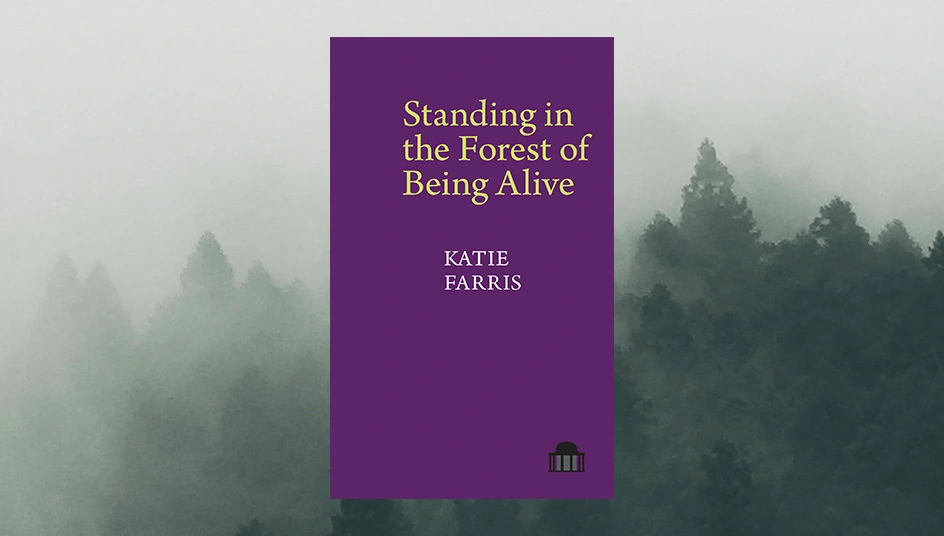Stephanie Sy-Quia reads the new poetry collection by Katie Farris and discovers a message of hope and perseverance.
Katie Farris’s second collection revolves around treatment for breast cancer, with the mastectomy as the great before and after – a dividing line along which most of the collection falls. Other moments of magnitude are the Capitol insurrection of January 6, 2021, the onset of the Covid-19 pandemic, rising nationalism, and the general end-times atmosphere of rampant wildfires et al. In fact, the opening poem, ‘Why Write Love Poetry in a Burning World’ announces the collection’s stated aim for itself: ‘To train myself to find in the midst of hell / what isn’t hell.’ The conflation of climate chaos as hell incumbent, and the more personal eschatology of losing a breast and getting older (‘six days before / my thirty-seventh birthday, / a stranger called and said, / You have cancer. Unfortunately’), makes for a delicate mix (‘Tell It Slant’). ‘To train myself in the midst of a burning world / to offer poems of love to a burning world’ (‘Why Write Love Poetry in a Burning World’). Indeed, all of these poems are love poems: to a self bent on gnawing itself to death, to a lost breast, to a sexual self on pause (‘What is not hell is whispering, I like my body / when it’s with your body’) (‘The Wheel’), to a pathologist, to a partner (‘take out / my trash like a young boy // with a crush’) (‘The Man You Are the Boy You Are’).
The Sexual Self, Stalled
Where these poems make the most interesting contribution is by depicting a sexual self stalled by radiation therapy, or claiming the voice of the ill beloved being cared for. ‘I Wake to Find You Wandering the Museum of my Body’ includes the lines:
My organs are
The furniture galleries
Everyone skips, but for you,
Carpenter, standing
Guilt-fingered before
My heart’s armoire,
Stroking always toward the grain.
Observe the short lines, their mild mix of Anglo-Saxon and low-key Latinate words (skip, finger, stroking, organs, galleries, carpenter), then the slow luxurious internal rhyme of heart with the stand-out loan word armoire. This is the brevity of large emotions’ great momentum, what the greetings card secretly strives for but can only hope to parody. There is great tenderness and a love-worn intimacy at work in these poems. The evocation of being surprised by one’s sex drive in ‘An Unexpected Turn of Events Midway through Chemotherapy’ (‘I’d like some sex please’) recalls Sharon Olds’s ‘sweet / smashes’ in her divorce collection Stag’s Leap: eros sneaking up in unsuspecting places. The intimacy and weariness also appear in relation to one’s own body, as the specific nature of cancer always makes clear:
Will you be
my death, breast?
I had asked you
in jest and in response
you hardened—a test
of my resolve? Malignant
magnificent palimpsest.
(‘Emiloma: A Riddle & an Answer’)
The Body Bent on Destruction
Of course, the body bent on its own destruction, or duplicitous multiplication, provides a good analogy for the body politic of the United States c.2021. so, at least, a certain kind of poetic thinking would go. There are several invocations of ‘America’ in this collection, which drag slightly, too monolithic in their incantations. Take, for instance, the following from ‘In the Early Days of a Global Pandemic’: ‘—in America, / which is to say, everywhere—’. This subtle critique of US hegemony is double-edged: on the one hand, the acknowledgment, from one of the US’s own, of the States’ incredible solipsism when it comes to world affairs, and on the other, a defeatist acceptance of it. And again, in ‘The Invention of America’, we have the following:
I am trying to be a love poet though I cannot escape
America it’s as if I am married to
America and no one stood to object
America would have objected itself if
America wasn’t so busy trying to jam
America on my finger …
The opening division between love poetry and nationhood would be more interesting if itself made the subject of the poem. Instead, the speaker cries: ‘As an anti-capitalist act, I reject your hierarchies of worth, America— // All things are erotic’; and: ‘Everyone is writing about a country / as if a country existed’; including, Farris. The parallel being drawn, however – cancer patient, United States, there is something rotten in the state of Denmark, etc. etc. – remains latent in the collection. To draw it out more wouldn’t necessarily have improved matters, but to leave the impulse to draw parallels in the first place goes underexamined. The desire to transpose the personal self onto the national or global one is a somewhat worn poetic impulse. To Farris’s credit, she does probe the notion of nations altogether, but I would have been interested to see more.
A Woman in the Mirror
The spectres of Walt Whitman and Emily Dickinson also loom large: Dickinson, the recluse whose poetry accompanies the speakers to medical appointments, muse of the cracked, the hyphenated; and Whitman, the epic presumptive with one eye on the news. In ‘A Row of Rows’, this dichotomy between two great American poets forms the basis of an argument, as well as ‘the ripeness of / bananas, the rawness / of the meat’, the titular argument contriving to be ‘just enough / to pull our days / taut’. Farris’s speakers, we sense are vying to position themselves somewhere between these two titans of the American canon, with a certain Sontagian, illness-and-its-metaphors, twist. Ultimately, Farris’s speakers say, in their ‘sans / serif sel[ves] (‘Said the High Priestess to the Magician’)’, ‘we go down howling // beating the drums of our own / bodies—’ (‘The Wheel’), and are met with
unexpected choice between
uncertain death and certain damage,
I find in the mirror a woman—breastless, burned—who,
in an advisory capacity,
asks, How much do you
want to live?
Enough.
(‘To the God of Radiation’)
Here, Farris steps away definitively from the poet-proper persona she has danced around, with Whitman, with Dickinson; in her advisory capacity, she succeeds in boiling down all poetic endeavour, all our angst, into a single question. Here the poet has bumped up against the caesura of her life, delineated by those two prolonged dashes, and she has come through the fire, to pass back a message of hope and perseverance.
You can order Standing in the Forest of Being Alive by Katie Farris (Liverpool University Press) here.

Stephanie Sy-Quia’s Amnion is published by Granta Poetry. In 2023 she was Guest Curator for Ledbury Poetry Festival.


Add your Reply
You must be logged in to post a comment.